| Srl | Item |
| 1 |
ID:
027133
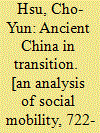

|
|
|
|
|
| Publication |
Stanford, Stanford University Press, 1965.
|
| Description |
viii, 240p.Pbk
|
| Standard Number |
0804702241
|
|
|
|
|
|
|
|
|
|
|
|
Copies: C:1/I:0,R:0,Q:0
Circulation
| Accession# | Call# | Current Location | Status | Policy | Location |
| 012691 | 931.03/HSU 012691 | Main | On Shelf | General | |
|
|
|
|
| 2 |
ID:
113882
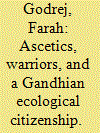

|
|
|
|
|
| Publication |
2012.
|
| Summary/Abstract |
I argue here that a clearer conception of Gandhi's nonviolence is required in order to understand his resonance for contemporary environmentalism. Gandhi's nonviolence incorporates elements of both the brahmin or ascetic, as well as the ksatriya or warrior. Contemporary environmental movements by and large over-emphasize the self-abnegating, self-denying and self-scrutinizing ascetic components of Gandhi's thought, to the neglect of the confrontational and warrior-like ones. In so doing, they often also over-emphasize the ethical dimension of Gandhi's thought, missing the discursive political dimension with which this Gandhian ethics is interwoven. I will argue here that the warrior-like and confrontational political aspect of Gandhi's nonviolence must be brought to the fore in discussions of environmentalism. In so doing, Gandhi can be read as an advocate of a certain form of "ecological" citizenship, requiring both the scrutiny of one's bodily consumptive behaviours, as well as the placement of one's body on the frontlines of aggressive political contestation.
|
|
|
|
|
|
|
|
|
|
|
|
|
|
|
|
| 3 |
ID:
048020
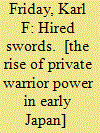

|
|
|
|
|
| Publication |
Stanford, Stanford University Press, 1992.
|
| Description |
ix, 265p.pbk
|
| Standard Number |
0804726965
|
|
|
|
|
|
|
|
|
|
|
|
Copies: C:1/I:0,R:0,Q:0
Circulation
| Accession# | Call# | Current Location | Status | Policy | Location |
| 042393 | 952/FRI 042393 | Main | On Shelf | General | |
|
|
|
|
| 4 |
ID:
131900
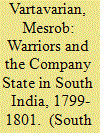

|
|
|
|
|
| Publication |
2014.
|
| Summary/Abstract |
After the collapse of the Mysore Sultanate in 1799, the British East India Company attempted to consolidate its authority in southern India by rolling back the prerogatives of warrior elites. This in turn generated revolts by disgruntled chieftains eager to retain their privileges. Conventional interpretations have viewed the relationship between independent warrior bands and the colonial state as mutually exclusive and irreconcilable. However a closer examination of the sources reveals that the emerging colonial state maintained control and pacified resistance by engaging in mutually beneficial alliances with loyalist warrior groups.
|
|
|
|
|
|
|
|
|
|
|
|
|
|
|
|
| 5 |
ID:
079228
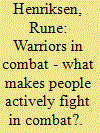

|
|
|
|
|
| Publication |
2007.
|
| Summary/Abstract |
This article discusses what it is that makes some soldiers overcome the challenges and suffering of combat to such an extent as to master rather than being overcome by it. It adds insights to the combat motivation literature emphasising the properties of combat while presenting a theoretical definition of the difference between soldiers and warriors. The implications of the existence of warriors for organising, recruitment, selection, motivation, leadership and training, equality, cost and employment are discussed, and it is found that there are two basic ways of organising warriors, the most prevalent being into Special Operations Forces. The paper concludes with reflections on the circumstances in which even warriors refuse to fight.
|
|
|
|
|
|
|
|
|
|
|
|
|
|
|
|